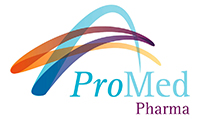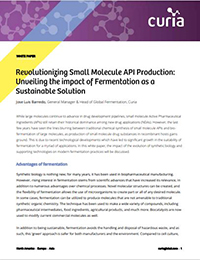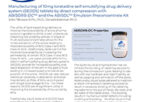Contract Services
WHITEPAPER - 3 Key Things to Consider When Choosing a Partner for Your Tech Transfer
One way of streamlining tech transfer is to partner with a CMO demonstrating a proven track record across the entire drug development and manufacturing continuum. Not only will an experienced CMO partner have the scientific ,,,,
SPECIAL FEATURE - Excipients: Advanced Biologics Require Innovative Excipient Science
Contributor Cindy H. Dubin speaks with several leading companies to discuss novel and functional excipients being developed, the role they will play in reformulations and new formulations, and their versatility in drug delivery.
FORMULATION DEVELOPMENT - Solving Tough Solubility Issues With Fewer Compromises & Better Outcomes
Anshul Gupte, PhD, says fortunately, enhanced solubility can be achieved using a variety of approaches. For oral solid dosage forms, well-established approaches include micronization, nanoparticles, amorphous solid dispersions (ASDs), lipid-based formulations, salts, and co-crystals.
ORGANIZATIONAL CULTURE - Assessing Quality Culture: Five Key Elements
Londa Ritchey, MBA, believes there is sufficient passive endorsement of the idea that building and sustaining a strong quality culture is linked to enhanced business efficiency.
ARTIFICIAL INTELLIGENCE - Embracing AI Requires Digital Literacy. How Will Your Organization Prepare?
Dave Watrous says a strong training roadmap for digital literacy begins at the top, and it begins far in advance of any major Artificial Intelligence or Machine Learning project rollouts.
DRUG DISCOVERY - Addressing Challenges in Drug Discovery: DEL Screening Applications
Matt Clark, PhD, explores DEL’s application in three areas of drug discovery that have received much attention throughout the past 5 years: Induced Proximity, Covalent Drug Discovery, and Machine Learning.
WHITEPAPER - Manufacturing of 10-mg Loratadine Self-Emulsifying Drug Delivery System (SEDDS) Tablets by Direct Compression With ABISORB-DC & ABISOL Emulsion Preconcentrate Kit
10-mg loratadine SEDDS were successfully manufactured with ABISORB-DC(TM) and ABISOL(TM) 2 by direct compression on a rotary tablet press, employing standard pharmaceutical manufacturing equipment…..
SPECIAL FEATURE - Improving Bioavailability & Solubility: The Never-Ending Quest
Contributor Cindy H. Dubin speaks with several companies to review their innovative technologies in this annual report on bioavailability and solubility.
DRUG DELIVERY - EUDRACAP® Select - Examining a Case From Development to Clinical Trial
Lucas Paulo Cusin, Kamlesh Oza, PhD, and Steven Smith, et al focus on the development of a customized functional coated capsule for the delivery of live biotherapeutics and demonstrate its effectiveness in the oral delivery of a sensitive proprietary microbiome ecosystem while simplifying the drug development process.
DRUG DEVELOPMENT EXECUTIVE - Thermo Fisher Scientific: What to Expect From the Next Wave of RNA-Based Therapeutics
Dr. Dale Patterson, Vice President and General Manager, Molecular Biology at Thermo Fisher Scientific, delves into the world of RNA therapies and understand their next act beyond COVID-19.
EXCLUSIVE ONLINE CONTENT

Kincell Bio & Imugene Announce Strategic Manufacturing & Process Development Partnership
Kincell Bio to acquire Imugene’s North Carolina manufacturing facility for up to $6M USD in upfront and milestone-driven payments over 3 years….

Naobios & Sumagen Sign Exclusive Partnership to Develop HIV Vaccine
Naobios will manage process development and initiate launch of cGMP manufacturing for Phase 2 clinical trials….

Asahi Kasei Bioprocess & Axolabs Announce Strategic Partnership to Accelerate Oligonucleotide Therapeutics Development
Asahi Kasei Bioprocess (AKB), part of the Asahi Kasei Group, and Axolabs have recently announced a strategic partnership in the burgeoning field of oligonucleotide….

4BIO Capital Portfolio Company Ascend Acquires Florida-Based GMP Manufacturing Capacity
Long-Term Partnership Agreed with Beacon Therapeutics for Clinical and Commercial AAV Production….

ProMed Pharma Acquires SpineThera Manufacturing Capabilities & Option to License Intellectual Property
ProMed Pharma LLC and SpineThera, Inc. recently announced ProMed Pharma has acquired SpineThera’s cGMP manufacturing operational assets. ProMed Pharma also obtained an option to….
MARKET NEWS & TRENDS
WEBINARS
WEBINAR - 2024 Trends in Topical Drug Delivery: Insights & Innovation
This webinar will discuss some of the key trends from these leaders in the topical market on both a global and regional level, including the increased importance of sensory properties and the rise in non-conventional product formats, among others…..

WEBINAR - Enabling Upstream Intensified Bioprocessing
Intensified upstream bioprocesses are being developed to increase productivity while reducing footprint, costs, and timelines for manufacturing. The higher cell densities generated by….

WEBINAR - Nanoparticle Suspensions: History, Applications & CMC Aspects
This webinar describes the history, CMC aspects, and potential applications of nanoparticle suspensions (NSs). This drug delivery technology should be considered for crystalline, sparingly water-soluble APIs. The presentation highlights….

WEBINAR - Impact of Process Re-design on Sustainability in Pharmaceutical Small Molecule Manufacturing
Join us for an upcoming webinar that delves into a crucial issue in the pharmaceutical industry. Recent research has revealed a surprising fact: the pharmaceutical sector has a larger carbon footprint than even the automotive industry, especially when we consider the entire supply chain’s impact on

ON-DEMAND WEBINAR – Solve Common Design Challenges in Inhalation Devices With Porous Polymers
The effectiveness of inhalation devices relies on their ability to deliver the pharmaceutical directly to the targeted part of the body with precision and calculated dosing. Since these devices….
WHITE PAPERS

WHITEPAPER - 3 Key Things to Consider When Choosing a Partner for Your Tech Transfer
One way of streamlining tech transfer is to partner with a CMO demonstrating a proven track record across the entire drug development and manufacturing continuum. Not only will an experienced CMO partner have the scientific ,,,,

WHITEPAPER - Manufacturing of 10-mg Loratadine Self-Emulsifying Drug Delivery System (SEDDS) Tablets by Direct Compression With ABISORB-DC & ABISOL Emulsion Preconcentrate Kit
10-mg loratadine SEDDS were successfully manufactured with ABISORB-DC(TM) and ABISOL(TM) 2 by direct compression on a rotary tablet press, employing standard pharmaceutical manufacturing equipment…..

WHITEPAPER - Revolutionizing Small Molecule API Production: Unveiling the Impact of Fermentation as a Sustainable Solution
While large molecules continue to advance in drug development pipelines, small molecule Active Pharmaceutical Ingredients (APIs) still retain their historical dominance among new drug applications…

WHITEPAPER - Minimizing API Supply Chain Risks
By the time your API is brought to a contract manufacturing organization (CMO), you have already put extensive amounts of resources into developing it. It becomes essential….

WHITEPAPER: Innovating Pharma Barrier Packaging for a Sustainable Future
Honeywell Aclar® thermoformable film enables pharmaceutical and medical device companies to achieve their sustainability commitments….
Contract Services Market Overview
Increasing patent expirations of major drugs, the growing burden of chronic diseases, and elevated global awareness of vaccines are leading to a surge in outsourcing formulation development services. Industry experts say these trends put a value on the global pharmaceutical CDMO Market at $160.12 billion in 2020, and could reach $236.61 billion by 2026, while the North American CDMO market is expected to reach $101.1 billion by 2030. As more pharma/biopharma companies opt to partner with CDMOs, much of this activity is occurring in the early phase of development with the goal of overcoming risk, along with saving time and money as a drug passes through the development pipeline.
Sectors of the CDMO market – sterile injectables, prefilled syringes, biologics APIs, and viral vectors – are expected to expand quickly, driven by an accelerating shift in the pharmaceutical market toward innovative biologic and cell and gene therapy products. Nonetheless, small molecules will continue to represent the majority of prescribed drugs for the foreseeable future and thus are the major growth driver for the CDMO market.
Who Uses Contract Services?
Experts see a strong correlation between size of a company and its likelihood to outsource. In 2017, manufacturing of 20% of newly approved drugs was outsourced by Big Pharma; this increases to 80% of all manufacturing being contracted out by small biotech/pharma. And all 15 newly approved drugs in 2017 owned by small companies were supplied by CDMOs.
Rare diseases, fast-tracked drugs, and oncology treatments now account for much of pharma’s development pipeline, so it is important that CDMOs provide specialized capabilities, technology, expertise, and experience relevant to these types of programs. For expedited pathways, it is important, too, that development partners understand the interwoven and related steps essential to progressing a program efficiently and quickly. To that end companies have invested in technology and capabilities such as hot melt extrusion, spray-dry dispersions, and lipid formulation to provide options for small-molecule development, often to address the all-too-common hurdle of poor solubility and bioavailability.
How to Work with Contract Service Providers
Getting a CDMO engaged in the development process as early as possible avoids spending time exploring the wrong solutions and coming up with suboptimal formulations that need to be corrected before manufacturing. By bringing a CDMO in earlier in the process, they can more accurately assess which technologies and approaches can work on a project.
As drug products become more complex, there is increasing customer demand for relationships with CDMOs that have core competencies in highly specialized formulation and process technology areas.
One of these specialty areas is complex molecules. Biotech companies developing novel biologics are increasing in the market, thus there is an increase in outsourcing development services to BioCDMOs. To serve the needs of this market, companies are expanding their bio capabilities to offer advanced manufacturing technologies.
Another area of expertise where pharma is relying on CDMOs is in cell and gene therapy. Industry insiders expect gene therapy manufacturing market to boom and grow at rates ranging from 15 to 20%. Benefits of partnering with a cell or gene therapy CDMO include scalability, speed to market, access to technical expertise without overhead costs, and cost efficiencies. Demand for specialized manufacturing and clinical trial support for cell and gene therapies has resulted in more than 40 companies offering these services.







